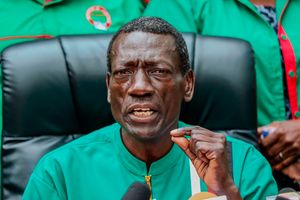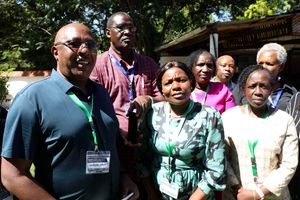
Kenya National Union of Teachers Secretary-General Collins Oyuu (left) and Kenya Union of Post Primary Education Teachers Secretary-General Akelo Misori.
The Kenya National Union of Teachers (Knut) has staked a claim to the 46,000 junior school teachers who it claims are members of the union by virtue of their posting and work stations.
It opens a battle front with the Kenya Union of Post Primary Education Teachers (Kuppet) which has been receiving agency fees deducted from the teachers by the Teachers Service Commission (TSC).
At stake is the more than Sh40 million monthly fees from the teachers who are now under permanent and pensionable terms after serving as interns for two years.
“The junior school teachers are in primary schools, which fall under Knut jurisdiction and not secondary schools, which is our sister union Kuppet grounds” said Collins Oyuu, the Knut secretary-general.
Mr Oyuu accused TSC of having an ulterior motive by “forcing” the teachers to be represented by Kuppet in what he claimed was aimed at driving a wedge between the two teachers’ unions.
“In the education sector, we are currently driven by the Presidential Working Party on Education Reforms and the recommendation therein has no junior secondary school, but junior school. It is a position recognised by the government. The JS teachers are in the primary section and fall under the purview of Knut,” Mr Oyuu said.
The question as to whether the JS teachers fall under Knut or Kuppet has been a long drawn debate between the leadership of the two unions with each claiming a share of the cake in what is seen a fight for revenue streams.
“The law is very clear on the membership of a trade union by teachers. The Labour Relations Act states that one becomes a member of a union by filling a membership form, which has not happened in the current case,” Mr Oyuu said.
“The constituency of a union’s membership is based on where one’s services are domiciled. If your services are domiciled in primary school, you are a member of Knut and if you are in secondary, you are a member of the Kuppet,” Mr Oyuu claimed.
Section 49 of the Labour Relations Act, states that a worker who enjoys a Collective Bargaining Agreement (CBA) benefits negotiated by a union will pay agency fees equivalent to monthly membership dues.
The teachers’ employer (TSC) has been deducting and remitting to Kuppet Sh859 from the JS teachers as agency fees since February this year. To entice the junior school teachers, Knut has created one position for them in its leadership structure at the branch level, the regional and national level.
Mr Moses Nthurima, the acting Kuppet secretary-general said the JS teachers were legally members of the union and that they would not cede ground to any other player in the labour representation.
“Even in our leadership order right from the grassroots to the national level, we have slots for the JS teachers” Mr Nthurima said.
Mr Edward Obwocha, the Kuppet secretary for secondary schools said the posting of the JS teachers were to secondary and not primary sections of schools in the country.
“It has been clear from the onset that the JS teachers are in the secondary school section, but deployed to the integrated schools.
By all means, they are Kuppet members” Mr Obwocha said in Bomet County.
In its disputed constitutional amendment which was controversially adopted on December 20, 2025 but whose implementation has been frozen by the Labour Relations Court following an injunction by members, Kuppet has created a position for the JS teachers in its leadership structure – assistant secretary, junior school.
President William Ruto has said his administration has in the last two years employed 76,000 teachers and more would be taken on board under permanent and pensionable terms in the 2025-2026 financial year.






